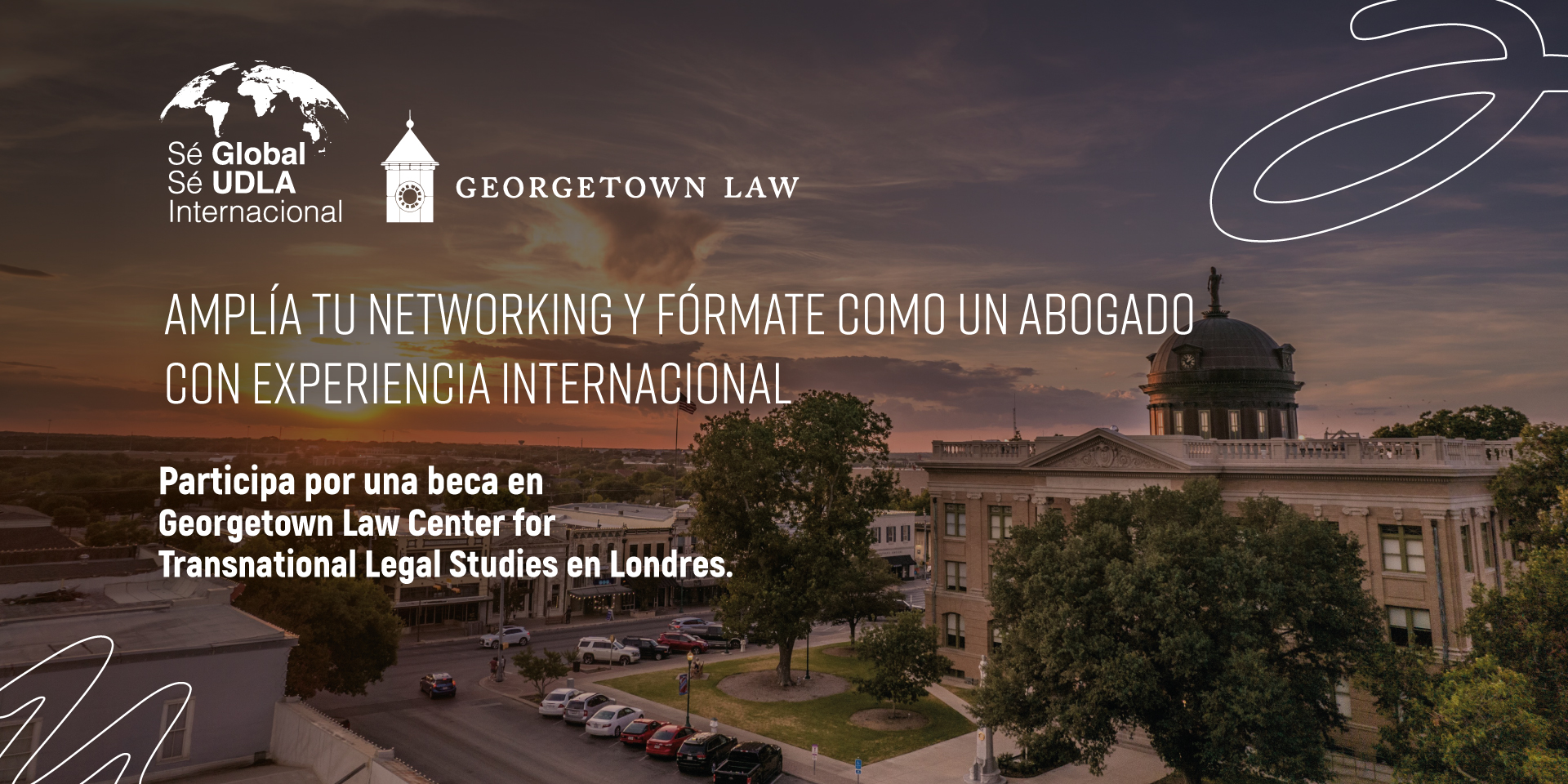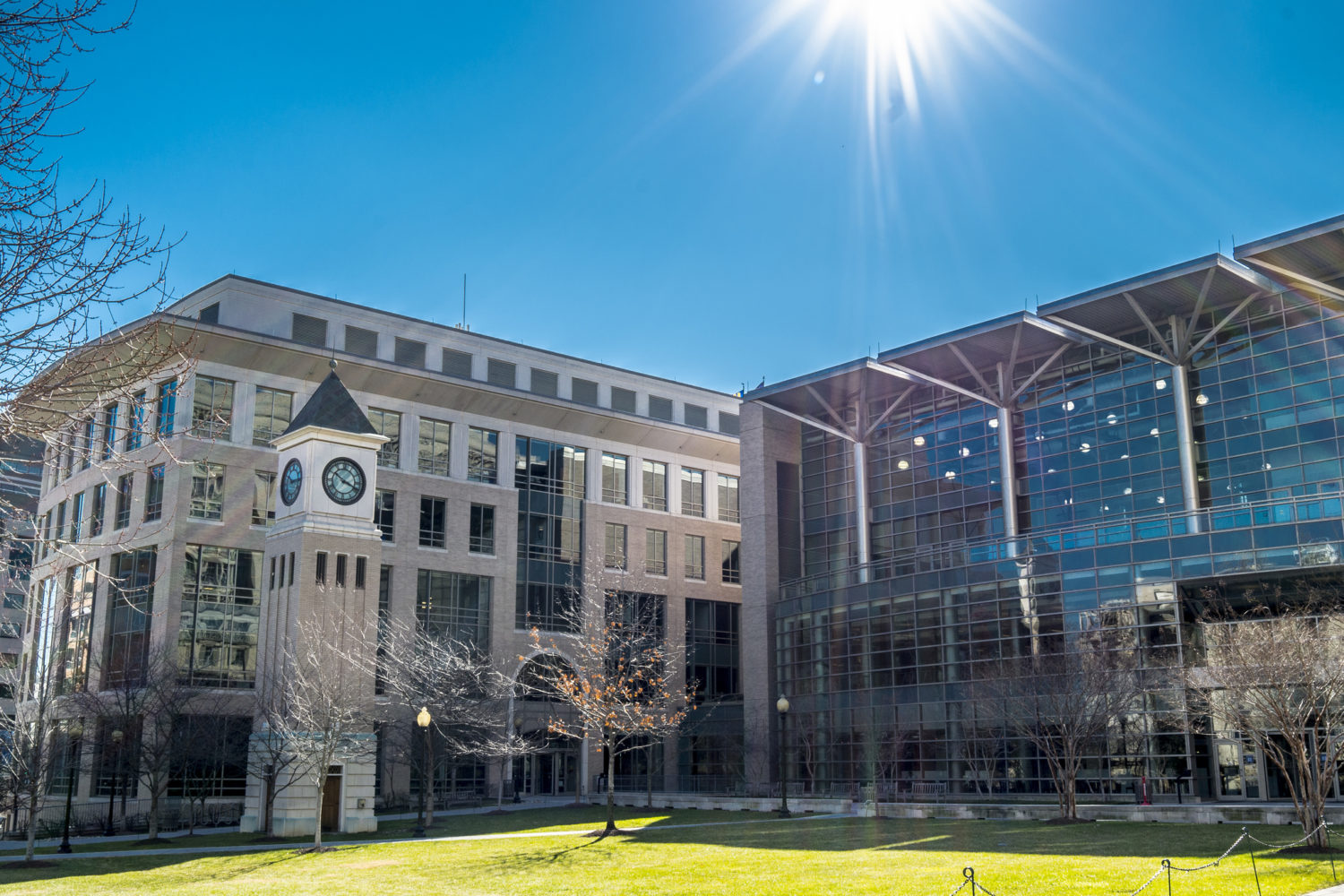
Beca CTLS EN Georgetown para un semestre en Londres.
Gracias a nuestra colaboración académica con Geogetown Law Center for Transnational Legal Studies se da inicio a la primera convocatoria para realizar un semestre presencial en Londres, Reino Unido; entre agosto y diciembre de 2023.
Hay 1 plaza disponible en el marco de la presente convocatoria y sólo podrán postular estudiantes de la carrera de la Facultad de Derecho.

Estipendios
Cada estudiante recibirá el siguiente beneficio socio económico:
- La beca incluye los cursos academicos que puedes tomar en Georgetown.
*El estudiante debe pagar el valor de su matrícula en la UDLA.

Información General
- Estudiar un semestre en el extranjero y especialízate en derecho internacional, comparado y transnacional.
- Ser parte de la única universidad ecuatoriana que te brinda acceso a la iniciativa global más innovadora y dinámica de Georgetown Law.
- Viajar y conocer el Reino Unido.
- Ser un profesional con perspectivas internacionales, trabaja en empresas, entidades no gubernamentales, organismos judiciales y más.
- Conocer estudiantes de otros países con los cuales podrás interactuar.
- Hacer un intercambio y obtener una certificación en estudios legales transnacionales
- Practicar otro idioma
- Agregarle valor a tu hoja de vida
- Conocer otras formas de enseñanza y aprendizaje
- Conocer la cultura británica
- Las materias que curses podrán ser homologadas en la UDLA*
- Recibir asistencia para tu semstre académico en CTLS.
* Previa revisión de tu Director/Coordinador de carrera.
- Ser estudiante de pregrado UDLA y estar estudiando el semestre 202320.
- Haber aprobado en la UDLA al menos 4 semestres de tu carrera di Derecho
- Tener un promedio general mínimo de 8.0 al momento de postular.
- Haber aprobado el nivel INGZ0444 de la UDLA y/o presentar un certificado de suficiencia del idioma inglés.
- Carta de motivación de por qué quieren realizar este intercambio de 1 carilla, espacio y medio, con letra Arial, tamaña 11.
- No haber cursado tercera matrícula en ninguna materia de la UDLA.
- Hoja de vida actualizada
- Costearse movilidad, estadía, residencia, visas y demás gastos.
Es responsabilidad de los estudiantes obtener la autorización de inmigración necesaria para ingresar al Reino Unido como parte de un programa de estudios en el extranjero.
Tenga en cuenta que las regulaciones de inmigración cambian con frecuencia y varían según su nacionalidad y duración de los estudios. Se recomienda que visite el sitio web del gobierno del Reino Unido para consultar la información actualizada sobre los requisitos de entrada del Reino Unido.
Los estudiantes que ingresen al Reino Unido con la Autorización de Entrada de Visitante deberán comprar un seguro médico internacional antes de su llegada.
Por su propia seguridad, debe asegurarse de tener un seguro médico internacional adecuado antes de ingresar al Reino Unido.
Los estudiantes participantes en el programa ingresarán al Reino Unido con una Autorización de Entrada de Visitante se les hará un recargo de salud de inmigración (I.H.S.) como parte de su solicitud de visa.
El I.H.S. cubrirá la atención primaria y secundaria bajo el sistema nacional de salud del Reino Unido (NHS) durante la duración de sus estudios Georgetown.
CTLS proporciona un folleto de seguridad personal, que establece información general para mantenerse seguro en
Reino Unido, incluidos los números de teléfono de los servicios de emergencia y detalles de otros servicios de salud y seguridad.
CTLS se encuentra en WC2, que significa West Central (2). Las áreas que lo rodean ofrecen sitios de residencia para estudiantes.
Vivir en el centro te permitirá llegar a CTLS en 10 a 20 minutos utilizando el transporte público. Sin embargo,
los precios de alquiler un poco más lejos del centro de Londres son más bajos, y estas áreas aún son muy
accesible.
Aquí hay algunas recomendaciones de alojamiento:
•82 Cornwall Gardens, SW7 4AZ (spacious flat with terrace in Kensington, 5min walking distance
from Hyde Park. One bedroom, suitable for 1-2 people). Contact simone.vrohr@gmail.com
• 121 O´Donnell Court, Brunswick Center (spacious and quiet apartment suitable for 1-2 people)
• 79 Clare Court, Judd Street, WC (spacious and quiet apartment suitable for 1-2 people)
• 25 Clare Court, Judd Street, WC (spacious and quiet apartment suitable for 1-2 people). The
landlord can be contacted via hsk8@nyu.edu
• 34 Russell Chambers, WC (spacious and quiet apartment suitable for 1-2 people)
• 83 Rossendale Way, Camden (small house over two floors, suitable for 2-3 people)
• 62 Noel Road, Islington (family house over four floors, suitable for 3-4 people)
• 24 Estelle Road, Hampstead, NW (family house over several floors, suitable for 3-4 people)
• Kingswood Court, 48 West End Lane (apartment suitable for 1-2 people). Please contact
Francesca Strumia: fstrumia@sjd.law.harvard.edu
• Southstand Aparments, Highbury, N5 1EY (apartment suitable for 1-2 people). Please contact
Sam Ricketson: s.ricketson@unimelb.edu.au
• Flat 10, 15 St. Ann’s Street, SW1P 2DE (apartment suitable for 2-3 people). The landlord can be
contacted via Shradhey.Rathore@acu.edu.au
• Flat 11, 15 St. Ann’s Street, SW1P 2DE (apartment suitable for 1-2 people). The landlord can be
contacted via Shradhey.Rathore@acu.edu.au
Las clases en CTLS seran del 20 de agosto hasta el 20 de diciembre DE 2023. Los estudiantes deberán presentarse una semana antes del inicio de clases para la Semana de Orientación organizada por la Oficina Internacional.
Las actividades esenciales de inducción / orientación brindan a los estudiantes información importante para que puedan tener éxito en sus estudios y convertirse en parte de la comunidad de la comunidad. Es un requisito que todos los estudiantes asistan a estas sesiones, y recomendamos encarecidamente que los estudiantes lleguen al menos un día antes de la bienvenida e inscripción. Por esta razón, los estudiantes recibirán una copia de su horario de inducción personalizado antes de su llegada.
La suficiencia debe demostrar que el estudiante ha sido evaluado en los 4 componentes específicos de lectura, escritura, expresión oral y comprensión auditiva.
Listado de cursos disponibles
- The Transnational Law Colloquium will meet weekly for presentations by leading academics and practitioners on topics of current international, transnational or comparative law interest. Each meeting will involve the presentation of a paper, brief comments, and a discussion with the author/presenter among all participants. Attendees will be the Center’s students, faculty and invited guests. Students, who will be divided up and each assigned to attend a sub-set of the colloquia, will write short responses to two of the papers in advance of the meetin.
- The Lectures in Transnational Justice are similar to the Colloquia; however, they are more formal, have a higher profile, and are aimed at the wider CTLS community within London. There will be two lectures each semester delivered by scholars or practitioners with significant transnational experience. Students must attend both lectures.
This course seeks to introduce CTLS students to the various forms of law that comprise “transnational law.” Philip Jessup, who coined the term, defined such law as “all law which regulates actions or events that transcend national frontiers . . . [including] [b]oth public and private international law . . . [and] other rules which do not wholly fit into such standard categories.” Philip C. Jessup, Transnational Law (1956). Today, the category of “other rules” that Jessup sought to highlight has grown considerably and includes a wide variety of non-state-based regimes such as (for example) financial stability mechanisms, arrangements for cross-border information sharing among law enforcement agencies, internet standards bodies, and social media content moderation processes. Additionally, Jessup had in mind that transnational law would (primarily) deal with interstices between blocks such as domestic law and international law. As the course will show, things have evolved considerably since 1956, though the name has remained a useful tool.
In particular, the course analyses the impact of philosophical and religious traditions on the development of the concept of physical body and of the events related to it, such as birth, life, suffering (physical pain), and death in different area of the world. Then, it explores if and how the interplay among diverse moral principles have affected the way in which biotechnological innovations have been received and regulated by international and national legal systems. The course deals with topics such as assisted procreation, gestational surrogacy, abortion, organ transplantation, genetic engineering, cloning, medical ethics, animal testing and euthanasia. Each issue will be analysed using the tools of comparative law, to understand whether friction points in regulating the biosciences exist, both theoretically and operationally, among different legal traditions and legal systems within them, and how they look like.
This course explores the financial regulatory architecture of the European Union and the United States. This is an area, in which the EU has only recently asserted more centralised control, mainly due to the financial problems of financial institutions and Member States following the recent financial crisis. A comparison with the more established regulatory regime for financial services in the US will highlight the differences and similarities of both systems.
The course will focus on the regulatory architecture of financial regulation in the US and the EU. We will first discuss the evolution of financial regulation in the US, which over time has created a multitude of federal regulators (such as the SEC, the OCC, or the Federal Reserve Board) with considerable powers of rule-making, supervision and enforcement. We will then sketch out the regulatory frameworks and regulatory perimeter of US financial regulation. This will be followed by an introduction of US banking and securities regulation as well as the regulation of financial conglomerates, before examining in more detail supervisory and enforcement powers of federal and state agencies in these fields
The European Union (EU) is a family of liberal democratic countries, acting collectively through an institutionalized system of decision-making. The EU was set up as a consequence of the negative experiences of the founding member states during and in the immediate aftermath of the Second World War. The objective of peace went hand in hand with a desire to ensure that Europe was able to get back on its feet economically after 1945. Although the EU has changed dramatically since the early days of the Community, growth and employment remain at the top of the EU’s agenda. This course will review in depth the origins, evolution, structure and current challenges of the European integration project.
One of the six priorities of the European Union is an EU digital strategy to ensure a digital transition empowering people and businesses with the new digital technology. Law is part of the framework of this strategy. Contract law plays an important role in this respect. Some hard laws, but also some soft laws intend to create the conditions for the Digital Economy to function. The course will discuss some of these important documents, such as the new Digital Services Act, which will affect the digital commerce, or the new Omnibus Directive, but also soft laws such as the ALI-ELI Principles for a Data Economy: Data Transactions and Data Rights, which tackle all important contracts linked to the data economy, as well as some very recent Principles on automated contracting and digital assets as securities.
The course proceeds in three segments. The first segment introduces the idea of human rights from an historical, philosophical, analytical and critical perspective. The focus of this segment is on the development of international human rights law within the UN system and its implications for international law and politics. The second and main segment of the course is devoted to the study of key international human rights notions and concepts and their application in specific human rights instruments and contexts. Among the issues discussed in this segment are right relativism/absolutism, extra-territorial application of human rights, positive/negative obligations, derogations and reservations, interplay between different rights, group rights, digital human rights and the application of human rights at times of war. The third and last segment of the course explores the right enforcement mechanisms that have been put in place at the global, regional and national levels.
The course provides an overview of the basic institutions of legal system that is operating in the People’s Republic of China (PRC) and the fundamental concepts in the core areas of Chinese Law. The emphasis of the teaching is not on the “black letter law” but it is on the distinctive features of the Chinese legal system and major similarities and differences between this system and Euro-American legal systems.
What is the relationship between the idea of legal order and the idea of revolution – the (frequently violent) replacement of one legal order with another? Some have argued that by its nature a legal order cannot contemplate being replaced, while others have argued that the possibility of revolution is the ultimate guarantee of the rights of the people. This seminar course will explore a number of questions related to this debate.


